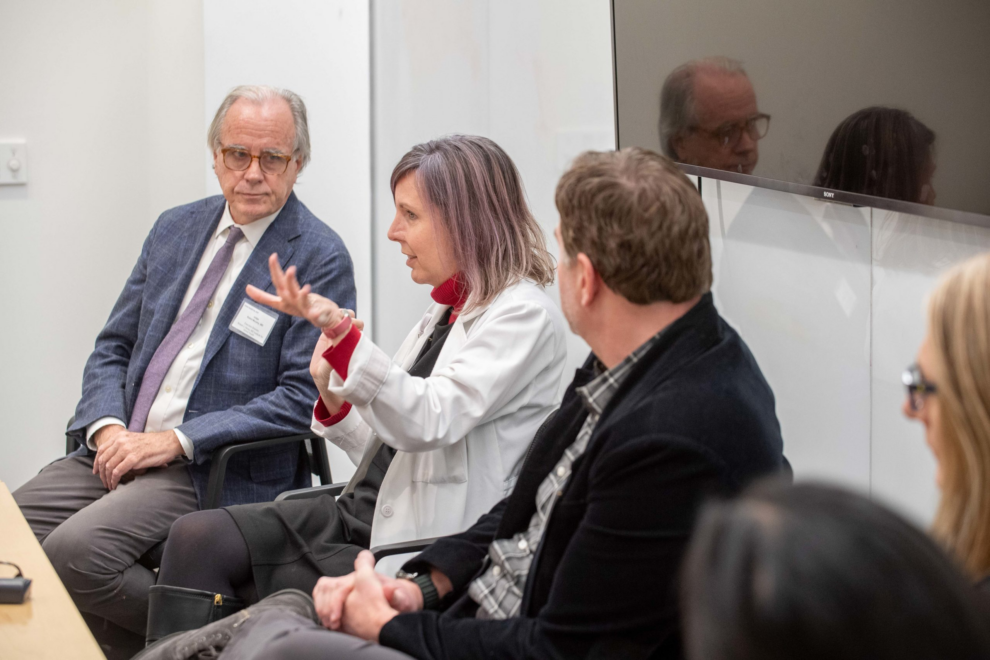Northwestern investigators, faculty, students and community partners came together to share and celebrate global health research, education and outreach as part of the 12th annual Global Health Day, organized by the Robert J. Havey, MD Institute for Global Health.
Held on December 1, Global Health Day featured keynote speakers, panel discussions and poster presentations, with opening remarks given by Robert Murphy, MD, the John Philip Phair Professor of Infectious Diseases and executive director of the Havey Institute for Global Health.
“Global Health Day culminates all the work that the students, residents and faculty at Northwestern have accomplished and today’s the day we get to demonstrate it to everybody else,” Murphy said.
The event, which also coincided with World AIDS Day, began with a panel discussion on the state of global AIDS management and recent developments in treating the disease.
Panelists included Murphy as well as Chad Achenbach, ’02 MD, ’02 MPH and Shannon Galvin, MD, both associate professors of Medicine in the Division of Infectious Diseases; and Claudia Hawkins, MD, MPH, director of the Robert J. Havey, MD Institute for Global Health’s Center for Global Communicable and Emerging Infectious Diseases.
“We have really effective prevention tools, we have very effective treatments, it’s just about getting it in the hands of people who know how to get it to their communities,” Galvin said. “We really need to reflect on how we can let the communities most impacted by HIV lead us and tell us what they need. We have about 1.3 million new infections a year and about 600,000 deaths; That’s way lower than it used to be. We’ve made considerable progress with a lot of funding initiatives and important innovative programs, both here and globally, but we still have a long way to go.”
Following the panel, attendees learned about global health research findings from Feinberg students, faculty and community partners at a poster session held in the Ryan Family Atrium.
Arthi Kozhumam, a second-year student in Feinberg’s Medical Scientist Training Program (MSTP), presented her research on the effectiveness of social media outreach and peer support for young men living with HIV in Nigeria.
“In Nigeria, the burden of AIDS is much higher than in other parts of sub-Saharan Africa,” Kozhumam said. “The illegality of men having sex with men is a factor that often inhibits other interventions from reducing the burden of HIV in the country. We know that social media and peer navigation have been proven to be helpful approaches for improving testing, continuity of care and linkage to treatment. My analysis focused on analyzing the intervention from an implementation science perspective.”
In the study, Kozhumam surveyed staff and peer navigators involved in a prior study who were assigned to assist young men in Nigeria living with HIV in getting tested and finding care using text messaging and social media outreach. Based on their responses to various questions about the program’s feasibility and helpfulness to the community, Kozhumam evaluated the ability of the program to be scaled up in other Nigerian cities.
“We found that the peer navigators reported a high level of readiness for the intervention and feasibility was highly rated by multiple other study staff in terms of the adoption and community benefit from the intervention,” Kozhumam said. “The program is currently in the process of being scaled up in more sites and hopefully next time, we’ll have more data to work with.”
Alan Soetikno, a fourth-year MD/MBA student, showcased his research which provided an update on COVID-19 cases and surveillance in the Middle East and North Africa.
“We really tried to look at different regions of the world and different countries within each region and see how they reacted to the pandemic,” Soetikno said. “We wanted to know what the unique things that each country or region instituted to combat the pandemic were, and how it affected their economy and society: what worked and what didn’t.”
By analyzing the trajectory of the COVID-19 pandemic, Soetikno and his collaborators hope to build a tool which can be used for real-time contagion tracking for the next pandemic.
“Traditional surveillance has limitations: it’s always retrospective and it only provides a historic snapshot of what happened in the past,” Soetikno said. “We’re trying to figure out if we can make a tool that is more real-time and can help predict what’s ahead in terms of the pandemic spread.”
The keynote address was delivered by Carlos del Rio, MD, distinguished professor of Medicine and co-Director of the Emory Center for AIDS Research at the Emory School of Medicine, who shared lessons from the HIV epidemic that could be applied to future pandemics.
During his speech, del Rio drew parallels between the inequalities experienced by people of color and historically marginalized communities during the COVID-19 pandemic and the prevailing inequities in treating HIV worldwide.
Despite advances in preventing and treating HIV and AIDS, systemic discrimination and lack of funding prevents care from reaching the African communities who need it the most, del Rio said.
“The lesson here with HIV is that we have the tools, we just haven’t implemented them,” del Rio said. “The implementation gap is the biggest challenge we have in making a significant impact in the HIV epidemic.”
In order to address both the HIV epidemic and the COVID-19 pandemic, the focus must turn to building effective public health systems as opposed to blaming individuals for systemic failings, del Rio said.
“In both pandemics, a lack of public health guidance from the highest levels of government left the public to navigate life at a time of deadly pandemics showing no signs of stopping,” del Rio said. “We have to figure out a way that our efforts acknowledge inequalities and address them, but do not increase them.”
This year’s symposium ended with closing remarks given by Murphy, who thanked this year’s attendees and awarded several poster presentation winners.
Source: Northwestern Medicine










